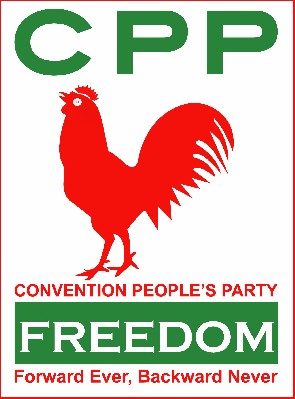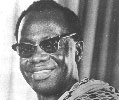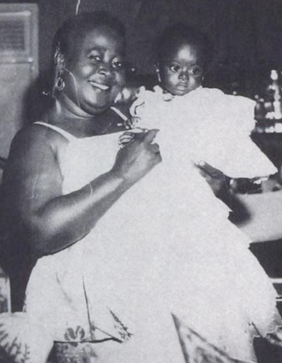Related Research Articles

Francis Kwame Nkrumah was a Ghanaian politician, political theorist, and revolutionary. He served as Prime Minister of the Gold Coast from 1952 until 1957, when it gained independence from Britain. He was then the first Prime Minister and then the President of Ghana, from 1957 until 1966. An influential advocate of Pan-Africanism, Nkrumah was a founding member of the Organization of African Unity and winner of the Lenin Peace Prize from the Soviet Union in 1962.

The area of the Republic of Ghana became known in Europe and Arabia as the Ghana Empire after the title of its Emperor, the Ghana. Geographically, the ancient Ghana Empire was approximately 500 miles (800 km) north and west of the modern state of Ghana, and controlled territories in the area of the Sénégal River and east towards the Niger rivers, in modern Senegal, Mauritania and Mali. The empire appears to have broken up following the 1076 conquest by the Almoravid General Abu-Bakr Ibn-Umar. A reduced kingdom continued to exist after Almoravid rule ended, and the kingdom was later incorporated into subsequent Sahelian empires, such as the Mali Empire. Around the same time, south of the Mali empire in present-day northern Ghana, the Kingdom of Dagbon emerged. The decentralised states ruled by the tindaamba were unified into a kingdom. Many sub-kingdoms would later arise from Dagbon including the Mossi Kingdoms of Burkina Faso and Bouna Kingdom of Ivory Coast. Dagbon pioneered Ghana's earliest learning institutions, including a university town, and a writing system prior to European arrival.
Yaa Asantewaa I was the Queen Mother of Ejisu in the Ashanti Empire, now part of modern-day Ghana. She was appointed by her brother Nana Akwasi Afrane Okese, the Edwesuhene, or ruler, of Edwesu. In 1900, she led the Ashanti war also known as the War of the Golden Stool, or the Yaa Asantewaa War of Independence, against the British Empire.

The national flag of Ghana consists of a horizontal triband of red, yellow, and green. It was designed in replacement of the British Gold Coast's Blue Ensign.

The Convention People's Party (CPP) is a socialist political party in Ghana based on the ideas of the first President of Ghana, Kwame Nkrumah. The CPP was formed in June 1949 after Nkrumah broke away from the United Gold Coast Convention (UGCC).

Kofi Abrefa Busia was a Ghanaian political leader and academic who was Prime Minister of Ghana from 1969 to 1972. As a nationalist leader and prime minister, he helped to restore civilian government to the country following military rule.
Joseph Emmanuel Appiah, MP was a Ghanaian lawyer, politician and statesman.
Kwame Sanaa-Poku Jantuah, originally known as John Ernest Jantuah, was a Ghanaian politician, lawyer and diplomat.

Sir Edward Okyere Asafu-Adjaye (1903–1976) was a Ghanaian political figure, lawyer and diplomat. He was the first Ashanti lawyer and Ghana's first High Commissioner in Britain with accreditation to France concurrently.
Mabel Dove Danquah was a Gold Coast-born journalist, political activist, and creative writer, one of the earliest women in West Africa to work in these fields. As Francis Elsbend Kofigah notes in relation to Ghana's literary pioneers, "before the emergence of such strong exponents of literary feminism as Efua Sutherland and Ama Ata Aidoo, there was Mabel Dove Danquah, the trail-blazing feminist." She used various pseudonyms in her writing for newspapers from the 1930s: "Marjorie Mensah" in The Times of West Africa; "Dama Dumas" in the African Morning Post; "Ebun Alakija" in the Nigerian Daily Times; and "Akosua Dzatsui" in the Accra Evening News. Entering politics in the 1950s before Ghana's independence, she became the first woman to be elected a member of any African legislative assembly. She created the awareness and the need for self-governance through her works.

Hannah Esi Badu Kudjoe, née Hannah Dadson, was a prominent activist for Ghanaian independence in the 1940s and 1950s. She was one of the first high-profile female nationalists in the movement, and was the National Propaganda Secretary for the Convention People's Party. She was a political activist during the government of Dr. Kwame Nkrumah. She was also an active philanthropist and worked to improve women's lives in Northern Ghana. Hannah had the ability to bring people together. She was able to convince others to support and fight for independence. She helped Kwame Nkrumah in bringing people to join the CPP and support it. She once helped the Big Six when they were arrested by bringing people together to call for their release by the colonial government.
James Kojo Obeng was a Ghanaian politician and teacher. He was the member of parliament for the Amansie constituency from 1965 to 1966.
Kobina Hagan (1923-1977) was a Ghanaian politician and teacher. He was the Principal Secretary for the Central Organisation of Sports (COS) from 1960 to 1963 and later member of parliament for the Denkyira constituency from 1965 to 1966.
The Ashanti Pioneer was a private newspaper in Ghana from 1939 to 1962. It was "a major mouthpiece for Asante interests".

Michael Kwasi Ossei was a Ghanaian politician and was a member of the first parliament of the second Republic of Ghana. He represented the Koforidua constituency under the membership of the Progress Party (PP).

The Political history of Ghana recounts the history of varying political systems that existed in Ghana during pre-colonial times, the colonial era and after independence. Pre-colonial Ghana was made up of several states and ethnic groups whose political system was categorized by 3 main administrative models; Centralized, Non-centralized and Theocratic states. In the colonial era, the British Empire employed different forms of government among its four territorial possessions in the Gold Coast. Indirect rule was implemented in the late 19th century after its success in Northern Nigeria. From the 1940s, native Ghanaians yearned for more autonomy. This resulted in the several constitutional reforms as well as the creation of the office of the Prime Minister in 1952.
Nana Kwabena Wiafe also known as Nana Kwabena Wiafe Ababio or, in private life, Kwabena Sanwo Ansah, was a traditional ruler and Omanhene of Offinso Traditional Area. He is known to be the first Offinso royal to be enstooled twice in Offinso history. He reigned from 1935 to 1945 and from 1959 to 1966.
John Wallace Tsiboe, also sometimes referred to as John S. Tsiboe (1904–1963) was a Ghanaian merchant and newspaper proprietor, the founder editor and owner of the independent Ashanti Pioneer.
References
- 1 2 3 Hargrove, Jarvis L. (2022). Ghana's Ashanti Pioneer Newspaper: Aim High, Strive Hard, Go Forward. Palgrave Macmillan. pp. 42–43. ISBN 9783031111044.
- ↑ Therson Cofie, M. (1 July 1952). "Mrs Tsiboe leaves for Britain". The Daily Graphic. p. 2.
- 1 2 Akansor, Justina (2023). "Missions and British Colonial Education for Females in the Gold Coast". In Amoako-Gyampah, Akwasi Kwarteng; Lundt, Bea; Agyeman, Edmond Akwasi (eds.). Education in Ghana: History and Politics. African Books Collective. p. 139. ISBN 978-9956-553-16-7.
- 1 2 3 Oppong, Adwoa Kwakyewaa (2012). Rewriting Women into Ghanaian History 1950-1966 (M.Phil). University of Ghana, Legion. p. 35.
- ↑ Denzer, LaRay (2005). "Gender & Decolonization: A Study of Three Women in West African Public Life". In Cornwall, Andrea (ed.). Readings in Gender in Africa. International African Institute. p. 220. ISBN 0-253-34517-0.
- 1 2 Owusu-Ansah, David (2014). "Tsiboe, John Wallace (1904-1963)". Historical Dictionary of Ghana. Rowman & Littlefield. p. 310. ISBN 9780810875005.
- ↑ Ahlman, Jeffrey S. (2017). Living with Nkrumahism: Nation, State, and Pan-Africanism in Ghana. Ohio University Press. pp. 127–8. ISBN 978-0-8214-4615-7.
- ↑ Marable, Manning (1987). African and Caribbean Politics: From Kwame Nrumah to the Grenada Revolution. Verso. p. 124.
- ↑ Richards, Christopher L. (29 November 2021). Cosmopolitanism and Women's Fashion in Ghana: History, Artistry and Nationalist Inspirations. Routledge. pp. 118–119. ISBN 978-1-000-47855-6.